Across the world, Muslims are currently observing Ramadan, a month long celebration of self-purification and restraint. During Ramadan, the Muslim recite Quran, do fast, abstaining from food, drink, smoking and sex between sunrise and sunset. Muslims break their fast after sunset with an evening meal called Iftar, where a date is the first thing eaten followed by a traditional meal. During this time, Muslims are also encouraged to read the entire Quran, to give freely to those in need, and strengthen their ties to God through prayer. The goal of the fast is to teach humility, patience and sacrifice, and to ask forgiveness, practice self-restraint, and pray for guidance in the future.
With the Dome of the Rock Mosque seen in the background, a Palestinian Muslim worshiper prays during the third Friday prayers of the Muslim holy month of Ramadan, in the Al-Aqsa Mosque compound in Jerusalem's Old City on Friday, Aug. 27, 2010. (AP Photo/Muhammed Muheisen)
A Bahraini man points skyward at dusk Tuesday, Aug. 10, 2010, in Hamad Town, Bahrain, towards where a slim crescent moon should be visible to indicate the start of the Islamic holy month of Ramadan, a time of prayer, fasting and charitable giving. Clouds hampered skywatchers in the Persian Gulf island nation. (AP Photo/Hasan Jamali)
A Musaharati, dawn awakener, strikes his drum to wake observant Muslims for their overnight 'sahur', last meal, before the day's fast in Sidon's Old City in southern Lebanon just before dawn August 11, 2010. (REUTERS/Ali Hashisho)
Kashmiri Muslims pray on a street on the third Friday of Ramadan, in Srinagar, India, Friday, Aug. 27, 2010. (AP Photo/Altaf Qadri)
A Palestinian Muslim man decorates an alley of Jerusalem's old city with festive lights in preparation for Ramadan on Tuesday, Aug. 10 2010. (AP Photo/Muhammed Muheisen)
The crescent moon is seen near mosques in old Cairo on the fifth day of the Muslim holy month of Ramadan on August 15, 2010. (REUTERS/Asmaa Waguih)
A young Palestinian Muslim girl walks in an alley of Jerusalem's old city holding a traditional Ramadan lantern while celebrating with other children the announcing of the holy month of Ramadan on Tuesday, Aug. 10 2010. (AP Photo/Muhammed Muheisen)
Muslim girls offer prayers before having their Iftar (fast-breaking) meal during the holy month of Ramadan at a madrasa on the outskirts of Jammu on August 21, 2010. (REUTERS/Mukesh Gupta)
A man prays during Ramadan Jummah prayer at the Islamic Center in Washington, D.C. on August 13, 2010. (JIM WATSON/AFP/Getty Images)
Indonesian chefs make miniature chocolate mosques for sale during the fasting month of Ramadan, at a chocolate shop in Jakarta, Indonesia, Friday, Aug. 20, 2010. (AP Photo/Tatan Syuflana)
Muslim pilgrims pray inside the Grand Mosque, with the Mecca Clock in the background, on the second day of the fasting month of Ramadan in Mecca August 12, 2010. The giant clock on a skyscraper in Islam's holiest city Mecca began ticking on Wednesday at the start of the fasting month of Ramadan, amid hopes by Saudi Arabia that it will become the Muslim world's official timekeeper. (REUTERS/Hassan Ali)
Thousands of Muslims gather in the Grand Mosque, in Islam's holiest city of Mecca and home to the Kaaba (center), as they take part in dawn (fajir) prayers on August 29, 2010, to start their day-long fast during the holy month or Ramadan. (AMER HILABI/AFP/Getty Images)
Thousands of Muslims circle the Kaaba inside the Grand Mosque in Islam's holiest city of Mecca, taking part in dawn (fajir) prayers on August 29, 2010. (AMER HILABI/AFP/Getty Images)
Jim Otun of Fairfield, New Jersey uses his iPad to read a dua in the Quran at Zinnur Books in Paterson, New Jersey. (AP Photo/Rich Schultz)
A Sudanese man reads the Koran on the first Friday of Ramadan in a mosque at Umdowan Ban village outside Khartoum, Sudan on August 13, 2010. (REUTERS/Mohamed Nureldin Abdallah)
A mahya reading "Hold the fast. find good health" hangs between the minarets of the Ottoman-era Eminonu New Mosque in Istanbul August 12, 2010. Mahya, where dangling lights suspended between minarets spell out devotional messages in huge letters, are intended to reward and inspire
the faithful who have spent the daylight hours fasting. Today just a handful of Istanbul's mosques use Mahya, the phrases dictated by Turkey's directorate of religious affairs. (REUTERS/Murad Sezer)
the faithful who have spent the daylight hours fasting. Today just a handful of Istanbul's mosques use Mahya, the phrases dictated by Turkey's directorate of religious affairs. (REUTERS/Murad Sezer)
Some 200 Muslims, inmates of the Quezon city jail in suburban Manila, are seen through a fence praying at the prison courtyard on August 13, 2010. The large Muslim minority in the Philippines - a country home to 75 million Catholics - is observing Ramadan, the holy fasting month of Islam. (JAY DIRECTO/AFP/Getty Images)
A Palestinian woman's shadow is seen on a wall as she waits while attempting to cross the Kalandia checkpoint in order to go pray at the Al Aqsa Mosque on the third Friday of the Muslim holy month of Ramadan, between Jerusalem and the West Bank city of Ramallah on Friday, Aug. 27, 2010. Israel loosened some restrictions on Palestinian movement between the West Bank and Israel during the Muslim fasting month of Ramadan. (AP Photo/Tara Todras-Whitehill)
Muslim men pray before Iftar, the evening meal in the Muslim holy month of Ramadan at the London Muslim Centre on August 18, 2010 in London, England. (Dan Kitwood/Getty Images)
A Palestinian Muslim man reads from the Quran, Islam's holy book, on "fajr" or early morning prayer, during Ramadan at a mosque in the West Bank city of Ramallah on Tuesday, Aug. 17, 2010. (AP Photo/Muhammed Muheisen)
Indonesian women pray during the first night of Ramadan in Jakarta on August 10, 2010. (ADEK BERRY/AFP/Getty Images)
A Syrian Muslim girl stands at the top of Mount Qassioun, which overlooks Damascus city, during sunset and prays before eating her Iftar meal on August 22, 2010. (REUTERS/Khaled al-Hariri)
A rainbow is seen as a Palestinian sprays water on Muslim worshipers leaving the Al-Aqsa Mosque compound to cool them off as the temperature rises, following the second Friday prayers of Ramadan, in Jerusalem's Old City, Friday, Aug. 20, 2010. (AP Photo/Muhammed Muheisen)
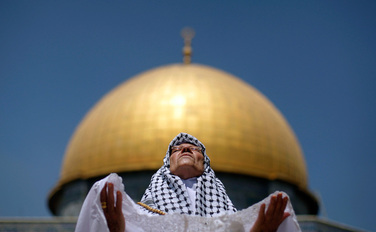
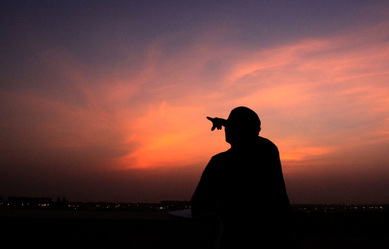
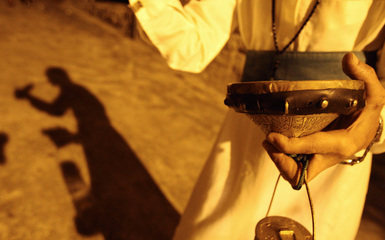
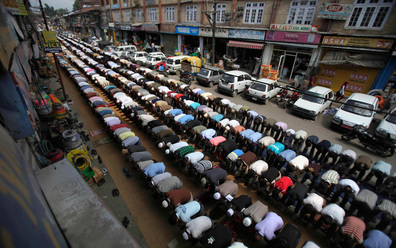
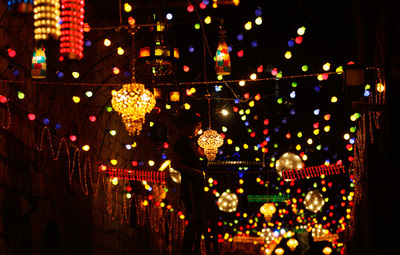
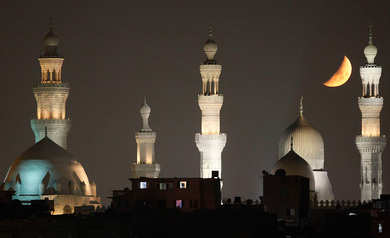
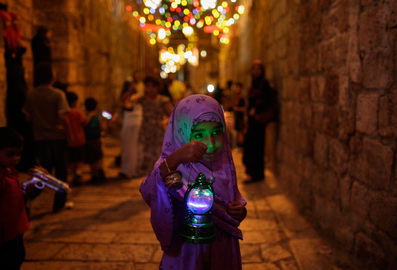
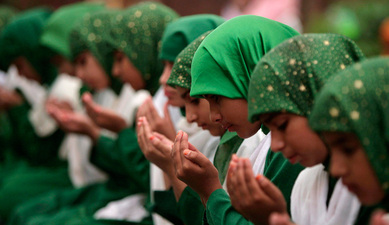
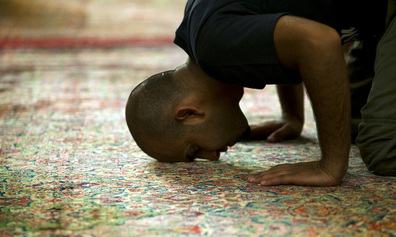
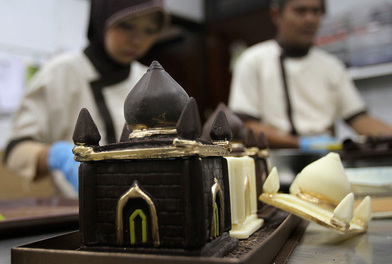
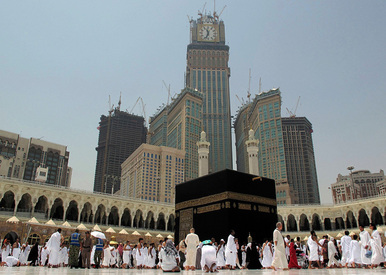
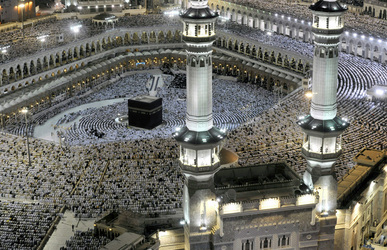
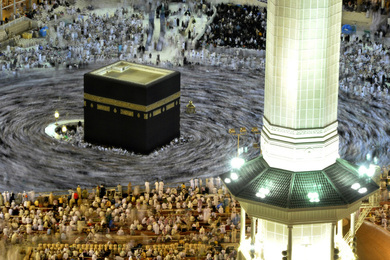
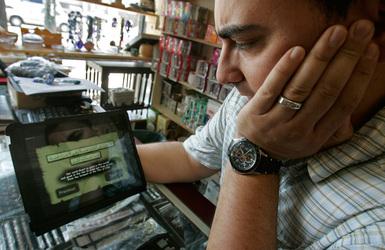
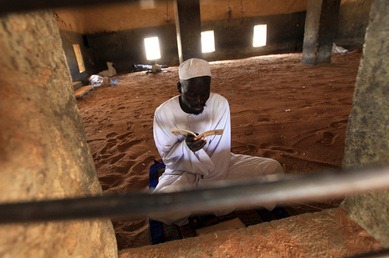
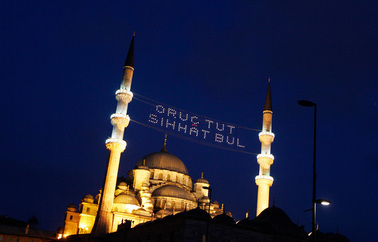
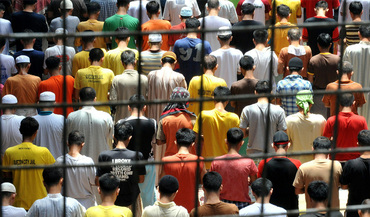
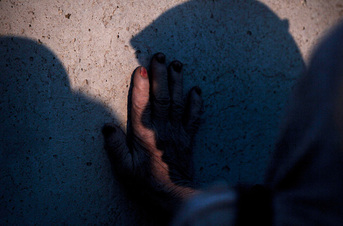
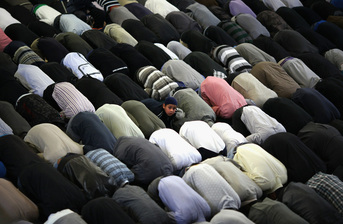
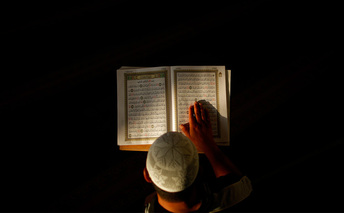
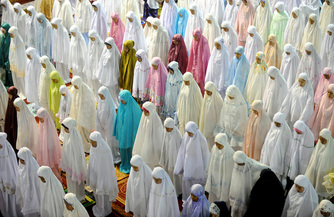
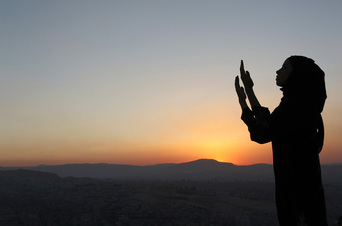
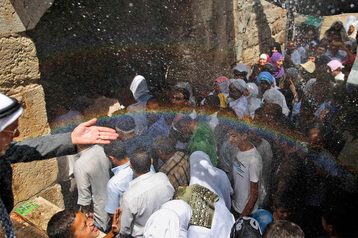

 RSS Feed
RSS Feed